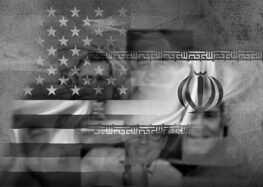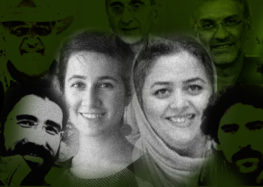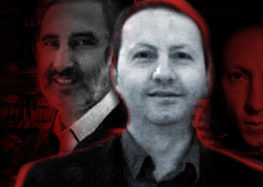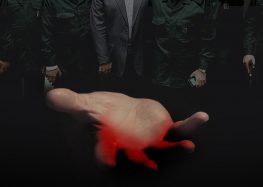Richard Ratcliffe Turns to UN and UK to Secure Wife’s Release From Iran
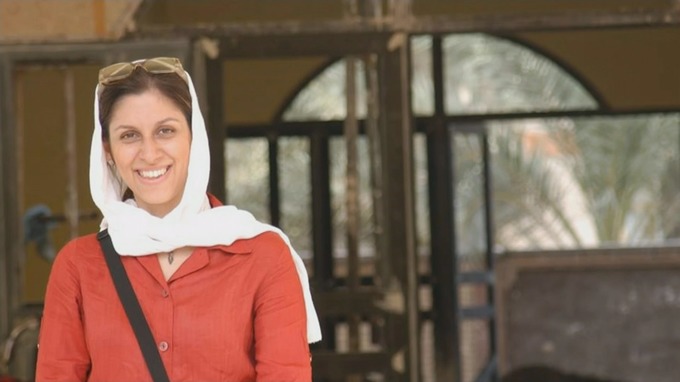 Nazanin Zaghari-Ratcliffe Diagnosed With Advanced Depression
Nazanin Zaghari-Ratcliffe Diagnosed With Advanced Depression
After exhausting all legal avenues in Iran to overturn the five-year prison sentence issued in a secret trial against his Iranian-British wife, Richard Ratcliffe is taking her case to the United Nations and may sue Iran through the UK court system.
“The UN Human Rights Council in Geneva meets in September [2017] and the human rights groups that support us will be going there to press our case,” Ratcliffe, whose wife Nazanin Zaghari-Ratcliffe has been in Tehran’s Evin Prison for more than a year, told the Center for Human Rights in Iran (CHRI).
“She had her first trial in September [2016], then she had her appeal in January [2017], which confirmed the five-year prison sentence, and then there was a Supreme Court review, which happened in April and that again confirmed the five-year sentence. So she sort of finished all her legal possibilities, as I understand it, in Iran,” he said.
Ratcliffe, who works as an accountant in London, told CHRI that if necessary, he would file a legal suit against Iran in the UK.
“There are ways we can pressure the British and Iranian governments more, politically,” he said. “Then there are legal things we can do. We have used the Iranian legal system to the end and we have used the UN working group to the end. But there are other mechanisms we have not yet used. So we are pushing to explore what we can do through the UK legal system.”
Ratcliffe also told CHRI he is following up on a ruling by the UN Working Group on Arbitrary Detention demanding that the Iranian government free his wife.
“Taking into account all the circumstances of the case, especially the risk of harm to Ms. Ratcliffe’s health and physical integrity and to the well-being of her child, the Working Group considers that the adequate remedy would be to release Ms. Ratcliffe immediately, and accord her an enforceable right to compensation,” stated the ruling in August 2016.
Advanced Depression
Suffering from the forced separation from her baby daughter Gabriella and her husband, Zaghari-Ratcliffe has been diagnosed with “advanced depression,” Ratcliffe told CHRI.
“Psychologically she has been very down,” he said. “Finally she got to see a psychiatrist three or four weeks ago, and she diagnosed her with advanced depression.”
“She was feeling suicidal, had uncontrollable dark thoughts and couldn’t sleep or concentrate,” he added. “Fortunately she has had three [therapy] sessions now and that clearly has helped.”
A project manager for the Thomson Reuters Foundation in London, Zaghari-Ratcliffe was on her way home after visiting family in Tehran when the Islamic Revolutionary Guard Corps detained her and Gabriella at the Imam Khomeini International Airport in Tehran on April 3, 2016.
Gabriella, who was 22-months at the time, was taken by the authorities and placed in the care of Zaghari-Ratcliffe’s elderly parents in Tehran.
Six months later, Zaghari was sentenced to five years imprisonment in a secret trial for national security charges that have still not been disclosed to her or the public.
Held in Evin Prison’s Women’s Ward after months of solitary confinement, Zaghari-Ratcliffe received physiotherapy from April to mid-June 2017 for neck and back pain and recently began attending therapy sessions.
Zaghari has been allowed phone contact with her husband once a week after the recent installation of a phone in the Women’s Ward. She has also been allowed visitations sessions with her family in Tehran, including Gabriella, on Wednesdays and Sundays.
“In terms of what hope do I have,” Ratcliffe told CHRI, “it’s been so arbitrary that it has been very hard as an outsider to know what’s really happening. There are mixed messages that contradict each other. We get positive messages then negative messages happening at the same time.”
“It feels like different parts of the Iranian regime are using Nazanin to fight each other, and it’s not clear who’s going to win that battle,” he added.
The judiciary’s ongoing imprisonment of dual nationals contradicts President Hassan Rouhani’s repeated calls for expatriates to return to Iran. The growing number of arrests also reflects hardliners’ efforts to prevent the engagement with the West that the Rouhani administration has sought to encourage.
At least 10 dual and foreign nationals are currently imprisoned in Iran.
Iranian-born Canadian resident Saaed Malekpour, serving a life sentence, has been held since October 2008; Iranian-American businessman Siamak Namazi, held since October 2015 and his father, 80-year-old Baquer Namazi, held since February 2016, have both been sentenced to ten years in prison; 77-year-old Iranian-British dual citizen Kamal Foroughi, sentenced to seven years in prison, has been held since 2011; Iranian-British dual citizen Nazanin Zaghari-Ratcliffe, sentenced to five years in prison in September 2016, British-Iranian citizen Roya Saberi Nobakht, held since October 2013, has been sentenced to seven years in prison; Nizar Zakka, a Lebanese-born US permanent resident held since September 2015, has been sentenced to 10 years in prison; and Iranian-Austrian dual citizen Kamran Ghaderi, held since January 2016, has been sentenced to 10 years in prison.
Iranian-American Karan Vafadari, held since July 2016, and Iranian-born Swedish resident Ahmadreza Djalali, held since April 2016, have yet to be sentenced.
*This article was modified on August 26, 2017, to reflect that Kamal Foroughi has been held since 2011.

